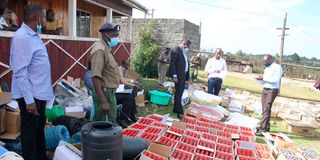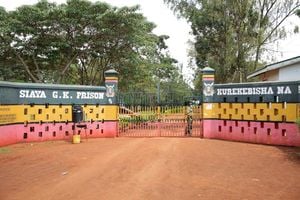Illegal ethanol trade fuels surge in use of illicit brew

Some of the second-generation spirits including over 500 litres of Ethanol and other contrabands of unknown value nabbed from an abandoned private timber factory in Elburgon, Nakuru County in this photo taken on February 08, 2022.
Illegal trade in ethanol is fast becoming pervasive in the country, fuelling a rise in the consumption of illicit brew. Last October, the Kenya Revenue Authority (KRA) seized 5,402 litres of illegal spirits and, the following month, it impounded another 8,520 litres.
In December alone, a month after the new administration reopened at least 26 alcohol manufacturers that had been shut down during former President Uhuru Kenyatta’s administration that number went up sixfold to 30,517.
In total, KRA reported that it had seized at least 44,439 litres of illegal ethanol. That number keeps increasing every week. In January, KRA officers impounded two trucks which had fake number plates in Loitoktok in Kajiado County while transporting 72,000 litres of contraband ethanol from Tanzania.
The lorries had both Kenyan and Tanzanian number plates, which KRA officials said were being interchanged to conceal their true identities. The two trucks had 288 drums of 250 litres each. This translated into 72,000 litres of ethanol, which would have seen the government lose Sh35 million in taxes.
Contradicting government policies and roadside declarations have engineered enforcement chaos in regulating alcoholic beverages, giving unscrupulous traders leeway to freely operate.
Industry players are now calling for urgent measures to curb the trend.
“We are seeing the worst crisis in years, thanks to recent policy pronouncements that have loosened regulatory checks,” said an industry insider.
Third-generation drinks
The government has reopened 26 alcohol manufacturers closed by the previous government. An increase in third-generation drinks has been reported in the market. Since November last year, KRA officers have been intercepting trucks transporting thousands of litres of contraband ethanol from Tanzania.
According to our source who did not want to be named because of the nature of his work, the majority of contraband ethanol is imported by top government officials through Tanzania to evade paying taxes.
On November 23, KRA officers seized 119 drums of contraband ethanol. Each drum had 25o litres. A senior detective based in Loitoktok told Nation the consignment belonged to a former senior government official.
Another source said unscrupulous traders are packaging third-generation brew in bottles belonging to popular brands and using fake KRA tax stamps to get their products on the shelves.
One of the industries most affected by fake stamps that continue to deny KRA and legitimate traders revenue is the liquor industry which has seen an uncontrolled flow of substandard liquor for mass consumption.
Recently, Business Daily reported that a Sh4.5 billion debt owed to a Swiss contractor by KRA pushed the National Treasury to propose the tripling of excise stamp charges.
It said that the debt to SISCPA, the Swiss company contracted to manufacture the stamps, is one of the main reasons that motivated Treasury to propose an increase in excise stamp taxes, that have jolted manufacturers who were expecting the cost of the stamps to drop by more than half, according to a new contract that KRA signed with the Swiss company.
Closed-door meeting
National Treasury Cabinet Secretary Njuguna Ndung’u told manufacturers during a closed-door meeting last week that the stamps had to be priced “correctly” to help KRA pay SISCPA the five-year debt.
Speaking last October, President Ruto said the country ought to be selling between 10 and 12 billion excise stamps annually but expressed concern that the KRA is only shifting 2.9 billion stamps with the remainder being produced by counterfeiters.





